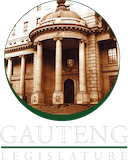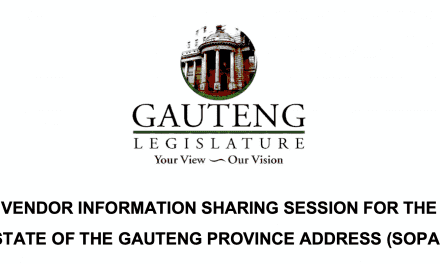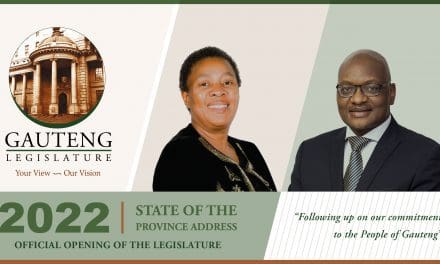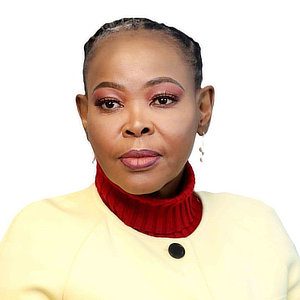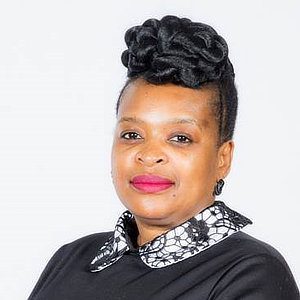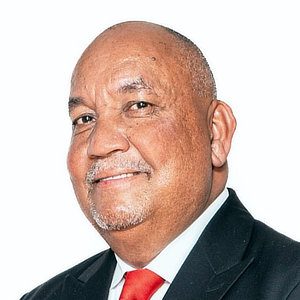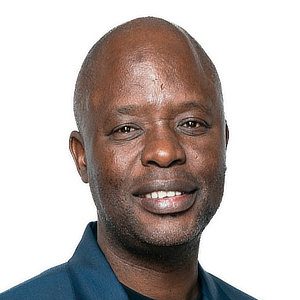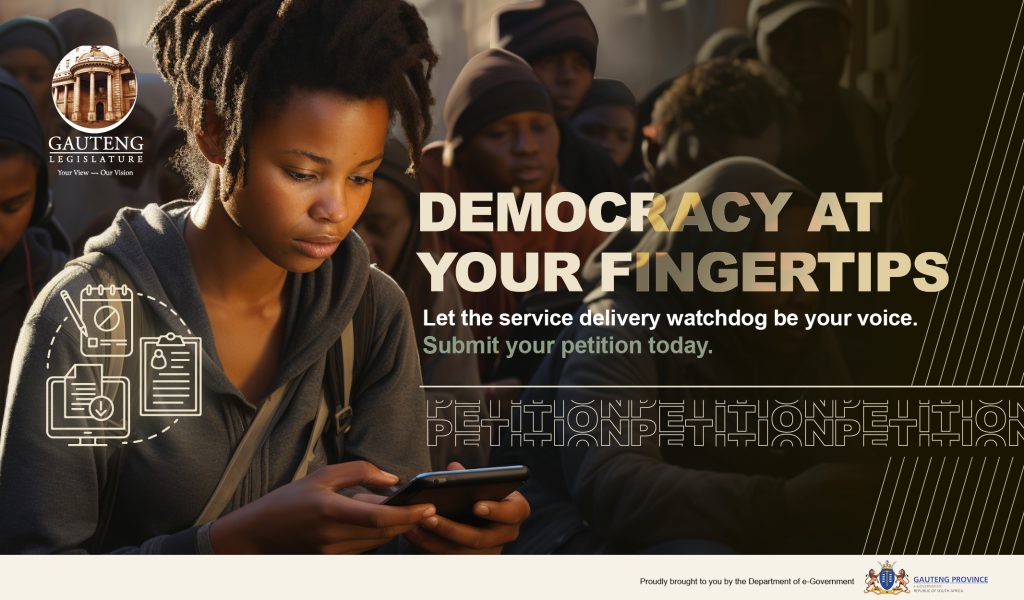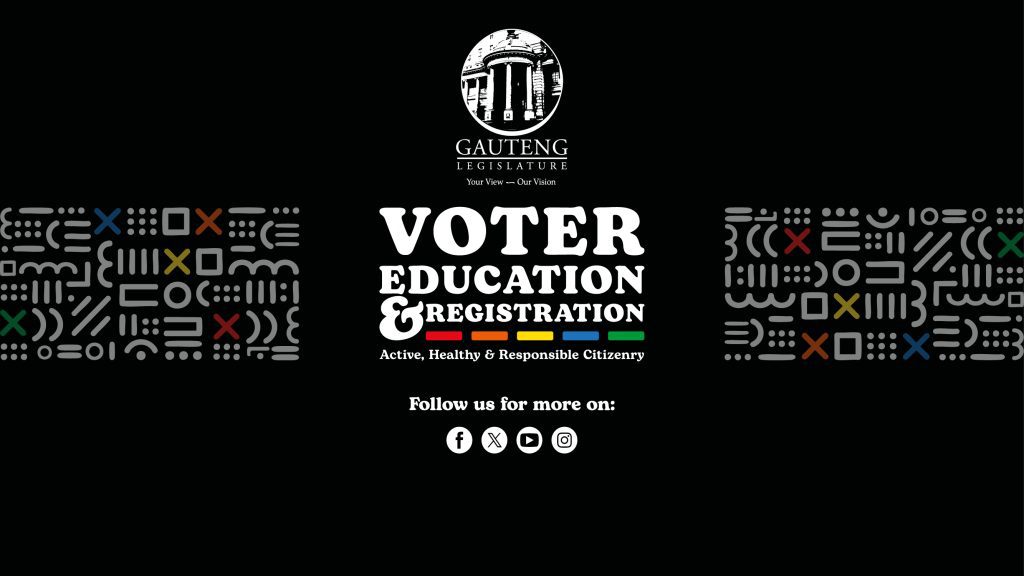“Re-igniting the spirit of resilience and excellence in Gauteng”
18 FEBRUARY 2019
Madame Speaker, Honourable Ntombi Mekgwe;
Deputy Speaker, Honourable Nomantu Nkomo-Ralehoko;
Chief Whip, Honourable Sochayile Khanyile;
Former President Kgalema Motlanthe and Mrs Gugu Motlanthe;
Former Premiers;
Members of the Executive Council;
President of the South African Local Government Association and Executive Mayors of Gauteng municipalities;
Honourable Members of the Gauteng Provincial Legislature;
Members of the Diplomatic Corps;
Veterans of the Liberation struggle;
Leaders of the Faith-Based Community;
Leaders of trade unions and business organisations;
Traditional leaders;
Director General, Heads of Departments, City Managers;
New Provincial Police Commissioner, Lt General Elias Mawela and Heads of Law Enforcement Agencies;
The People of Gauteng:
Today, I once more stand before you, as a humble servant of the people of Gauteng, to deliver the last State of the Province Address of the Fifth Provincial Administration.
On the 08th of May this year, our country will hold its sixth national and provincial democratic elections to usher in the sixth post-apartheid administration and legislatures at national and provincial level.
As we conclude this term, we are duty bound to reflect on the 25-year journey of change that Gauteng has been going through since 1994.
Our province has undergone major changes regarding the social structure, economy, infrastructure and the quality of lives of citizens.
Our population has doubled, from 7.8 million people in 1996 to 14.7. This makes Gauteng the most populous province in our country. Essentially, one in every four South Africans live in Gauteng.
Our economy has grown five times, from R290 billion in 1996 to R1.5 trillion in 2017.
Gauteng is not only the economic and industrial hub of South Africa, we are also the seventh largest economy in Africa.
The number of people employed in the Gauteng economy has also doubled – from 2.6 million in 1996 to 5.163 million in 2018.
The size of the public education and public healthcare system has also doubled.
In 1994, there were 1.2 million learners in public education and today there are 2.3 million learners.
Today Gauteng’s public health system serves 20 million healthcare users per annum, compared to 7 million in 1994.
The built environment of our province has changed profoundly as a result of the scale of investments in new social and economic infrastructure – new houses, schools, libraries, hospitals, clinics, social amenities, police stations, roads and other public transport infrastructure.
Access to basic services has increased from an average of 60% in 1994, to an average of 85% in 2018.
The 2018 Quality of Life Survey records that access to formal dwelling is at 81%; piped water at 91%; electricity at 92%; sanitation at 91% and refuse removal is at 83%.
The Quality of Life Survey also records that home-ownership among the poor is very high in Gauteng. The government housing programme has delivered more than 1.2 million houses in Gauteng, providing decent shelter to more than 4 million people.
Consequently, Gauteng residents have experienced continuous significant improvement in the quality of life and their level of satisfaction with basic services and infrastructure is above the national average.
Our province is a zone of opportunity that offers better living standards to millions of people. Hence, the high rate of in-migration.
Madame Speaker, these qualitative changes in the lives of the people represent a towering monument of progress during the twenty-five years of our democracy.
Working together with all sectors of the population of our province, we must do everything in our power to ensure that this progress is consolidated and the opportunities are enjoyed by all.
Honourable Members, we need to understand that we are a province of trailblazers and pioneers. We are the Home of Excellence in many areas of human endeavor.
Our province is endowed with citizens who are very self-driven, well-informed and better educated; they are eternally optimistic, more resilient and always determined to succeed against all odds; they refuse to live a life of despondency and despair.
Gautengers work hard to improve their own lives and those of their families and their communities; many are decent human beings who earn an honest living and pay their taxes.
As government, we need to understand that Gauteng people are proud of doing things for themselves, instead of depending on government for everything. They often say, during Ntirhisano, that they need a helping hand from their government, not hand-outs and patronage. This is their attitude and spirit.
Our province has a very active and impatient citizenry who have no tolerance for government officials who have no sense of urgency. They demand accountability, integrity and transparency from their government and don’t take kindly to public officials who are arrogant, dishonest, self-serving, corrupt and incompetent.
To have a citizenry with this kind of Attitude and Spirit is a blessing, not a curse. It is an honour to lead this province and serve its people.
The Gauteng Spirit lives among the people and is expressed in their diverse cultures through various art forms – song, dance, poetry, books, etc.
In his Poem titled “Kasi For Life”, Themba Emmanuel Mashobane cheers up those working hard in the townships to earn an honest living:
Your people who wake up in
The early morning. Pickup
Old tins and plastics for
Recycling just for them to
Put food on the table
Gives me hope.
To all the kasi guys at
Corner msawawa fruit shop
Big up. Our kasi old ladies
On that little braai stands
With their hot runner ways
I salute.
I salute you because you are
Doing something for your lives.
To our parents who are not tired
About gathering themselves for
Small scale farming at that kasi
Open field know that you humble me.
A young talented township musician from Katlehong, Kwesta, also grapples with the contradictions and challenges of urban life through his song, ‘Spirit’. The song is about religion, race, class, wealth, aspiration, appropriation, manhood, motherhood, resistance and resilience.
The essence of Kwesta’s song is best explained by Professor Lesley Lokko, an academic from the University of Johannesburg, who argues that ‘Spirit’ is about the paradox of life in the cities where things are in a constant state of becoming.
Accordingly, resilience and determination to succeed becomes the only choice. Giving up is not an option. This is the province of hustling!
Professor Lokko asserts that life in our cities requires a great of resilience because it is a paradox: “a seemingly insurmountable distinction between trying and failing, between success and compromise, and between experimentation and apathy”.
This State of the Province Address is dedicated to people in our cities – in the townships and in the suburbs – who are working very hard to make something great out of their lives in their efforts to build a better future for their families and communities. I salute you, all the hard-workers.
It is the spirit of hard work, resilience and excellence which inspires the daily work of the ANC-led government in this province.
As your humble servant, let me be frank with you: being the Premier of Gauteng is a tough job. Gauteng is a huge and complex province with citizens who want change now.
I think it is also not easy running a small city or small metro in this province is very tough. Please ask the mayors!
But, someone must step forward and do this job. My prayer is that those of us who do this job must always do so for the right reasons: the duty to serve and obligation to bring change in the lives of citizens.
As the ANC-led government, we shall not rest until Gauteng becomes a province in which opportunities are enjoyed by everyone, regardless of race, religion, gender and place of origin.
We shall not retreat from the dream of making sure that all the people of our province live in dignity as equals. We will not surrender to greed and corruption!
Gauteng has opportunities and capacity to enable all residents to realise their dreams.
Our province is a hub of talent and a sanctuary for dreamers from all over our country and continent.
We are a province of ambitious, entrepreneurial and hard-working people who are driven by the creative energy and the urge to make something out of nothing.
Madame Speaker, it is for this reason that as the ANC-led government we have been working together with the people to provide the skills, services, infrastructure and institutions that empower citizens to take full charge of their lives and pursue their dreams, while contributing actively to the creation of a society underpinned by justice, equity and inclusion.
The core mandate of the fifth administration is the Transformation, Modernisation and Re-industrialisation of the Gauteng City Region so that it can offer a better life for all. This is the spirit that drives Team Gauteng.
In this regard, the education, training and empowerment of the children and youth of our province remain the number one priority of the ANC-led provincial government in the effort to transform, modernise and re-industrialise Gauteng.
Investing in people is the most decisive act of national development. It is through education that we can unleash creativity and cultivate the spirit of resilience among citizens.
Over the past 25 years, this province has transformed the racialised public education system, inherited from apartheid, into a qualitatively improved system that offers better education to all learners, including those from the townships.
We have made huge investments in the transformation, modernisation and expansion of educational infrastructure and human resources to cater for the growing population and meet the needs of the new economy and society in the digital age or fourth industrial revolution.
We have introduced pro-poor policies to increase school attendance and educational achievement among children from poor households. These include the provision of school nutrition, school uniforms and dignity packs.
In the past five years alone, we have provided 1.2 million girl learners with dignity packs; 1.1 million learners with meals, daily, and 500 000 learners with school uniforms.
Gauteng is now the best performing province with regards to Grade 12 results. Eight out of ten best performing districts in the country are in Gauteng and all our districts perform above 80%. Our province contributed the largest number (43%) of bachelor passes nationally in 2018.
Much to the chagrin of the architects of grand apartheid, township schools have undergone significant transformation and modernisation and they are producing top performing learners in the STEM subjects (science, technology, engineering and mathematics).
Gauteng leads our country in gearing our education system for the future through the deployment of ICT to improve learning and teaching.
The rollout of schools of specialisation and re-opening of technical schools is part of preparing our children for the digital revolution. This will contribute to the development of artisans and technicians who are in high demand in the economy.
President Cyril Ramaphosa has made a policy decision to invest in early childhood development (ECD). This is a game changer that will have far-reaching impact into the future of our children. We are ready to lead in this revolutionary change.
In the past four years alone, we have increased access to ECD from 83 000 to more than 480 000 children.
We have also been introducing common standards and training for ECD practitioners through an international partnership with a revered Italian institute.
Although higher education is a national function, the provincial government has built a partnership with all Gauteng-based universities to collaborate on student accommodation; skills training and human resource development; public policy development and implementation; as well as innovation, research and development.
Currently, this ANC-led provincial government spends close to R1 billion annually on student bursaries in line with the priority skills that are aligned to the priority sectors of our economy.
Since 1994, more than 13 000 students from our province have benefitted from this programme.
To demonstrate practically that education is indeed the number one priority, I advised the Executive Council to sell the Premier’s Official Residence to enable more students from the townships to access university education.
The decision to forgo the luxury of an official residence has changed the lives of forty university students.
Young people are the priority of this ANC-led administration.
We have taken decisive steps to tackle the acute problem of youth unemployment by introducing Tshepo 1 Million as a programme to empower the youth with skills and open opportunities for them in the economy. The impact of this flagship programme has been phenomenal.
More than 510 000 young people have benefited from demand-led skills training and entrepreneurship development.
Tshepo 1 Million has brought hope and revived enthusiasm among the youth of our province. The stories of young people who have benefitted from this flagship programme are very inspiring and real.
Prudence Mahlangu: a 23-year-old young lady from Tembisa registered on the Tshepo mobi-site for the We Think Code boot camp course and now works at Telkom. Prudence says: “The course has made me view life in a very revolutionary way – that I can transform people’s lives through technology…how to step out of my comfort zone to build confidence and chase my dreams.”
Ashwil Graham: a 24-year-old young man from Eden Park right here in Alberton. He is currently working for Nedbank after getting a learnership opportunity through Tshepo 1Million. To other young people seeking employment Ashwil says: “Constantly remain positive, always be open to opportunities and show up!”
Banele Zwane: a 25-year-old young man from Mofolo in Soweto who was trained by Tshepo 1 Million. He now works as a data capturer. Banele’s life has improved considerably – he is now living independently, pays rent for his own space and manages to help his nieces and nephews financially. He is here with us today to say thanks to Tshepo 1 Million.
Sinnai Camille Baatjies: a young woman from Toekomsrus who recently graduated top of her class at the Boekenhoutkloof Traffic College as Gauteng Traffic Police Officer. She was among the 100 young people who were trained as traffic officers as part of the Tshepo 1 Million Safety Ambassadors programme. She is here with us today to say she will be an honorable traffic police officer who will never take bribes because she has been afforded an opportunity to serve our nation.
Nelisiwe Kabini: a young passionate entrepreneur from Ekangala. She is a beneficiary of the SASOL I Am Preneur programme, which is a Tshepo 1 Million partnership. Nelisiwe now runs her own events company: “Tshepo gave me a great push in realising my dreams.” Nelisiwe is here today to say: thank you to the private sector for partnering with Tshepo 1 Million.
Alphonso Joshua Botha: a young man from Rus-ter-vaal recently graduated from the Traffic College as part of the Department of Community Safety’s 100 young people who are part of Tshepo 1 Million programme. Having seen how drugs and crime destroyed the dreams of young people in his community, Alphonso wants to build a formidable career as a tough law enforcement officer who wants to keep our communities safe and free from drugs.
Wisane Malungane: a 25-year-old from Grasmere in Sedibeng was assisted by Tshepo 1 Million to set up a SmartStart Early Childhood Development franchise. Without prior skills in ECD, Wisane now owns a successful crèche and earns her own income.
Honourable Members, the spirit of the youth in Gauteng is that they don’t need handouts, they need a helping hand. They want to make something out of their lives, regardless of their background. We too must not disappoint them.
One of the areas in which the ANC-led provincial government has made irrefutable progress is in the township economy.
Prior to 2014, the provincial government’s procurement spent on township businesses was R600 million. Over the past five years, the ANC-led provincial government has procured goods and services from township businesses, worth more than R22 billion.
Gauteng is the pioneer, laboratory and leader in the revitalisation and transformation of township enterprises into sustainable and job-creating businesses.
We have provided financial and non-financial support, assisted with access to markets and invested substantial resources in industrial infrastructure such as agri-parks, industrial parks, automotive hubs and eKasi Labs.
The Township Entrepreneurship Awards and the Pitching Booster are platforms to showcase the entrepreneurial spirit, creative energy and innovation within the township economy. There are several individual entrepreneurs who have benefitted from government support here with us to share their stories.
Erie Bee-Shabangu from Rus-ter-vaal in Sedibeng, is one of the 181 entrepreneurs who have benefited from the Pitching Booster programme. She won R 40 000 from the Pitching Booster and used it to buy new equipment for her fashion design business.
Erie says: “I have the best sewing equipment in the world. I have a bigger space, it’s heaven. One of my biggest achievements that deeply mean a lot to me is to be able to teach young aspiring youth without funds to study fashion. I have enough equipment to take 2 to 3 students a year. The most important thing next year is that I’m finishing off my degree in Clothing and Textile and will finally have a formal qualification.”
Grace Hinana runs Noxolo Bed and Breakfast in Mamelodi, which started as a pub, and has now grown into three guest houses, and employs nine staff members from Mamelodi. Grace’s business has received lots of support from the Gauteng Enterprise Propeller and the private sector.
Reuben Nkosi of Reunko Steel Suppliers in Katlehong, runs a successful manufacturing business also supported by the Gauteng Enterprise Propeller. This business produces 20 000 bolts per month and employs 11 township residents. Its customers include Forester Timber, Summit Associate Industry, Anglo Ashanti and Ingwe Mines.
We also have Mr Popo Mabunda of Popo Construction and Projects from Ratanda. His entity manufactures bricks, lintels, steel doors, gates and windows. It also sells cement and other building materials to the township market. Government assisted the entity with technical and non-financial support.
One of the great stories of the township economy is how the transformative partnership between Pick n Pay, Old Mutual Masisizane Fund, Gauteng Enterprise Propeller and township spaza shop owners moved 11 spaza shops from survivalist to sustainable businesses.
The programme has enabled spaza shops to be converted into decent retail shops that have grown, on average from making R10 000 per month to R300 000 per month in profit.
In addition, the 11 township retailers have collectively created more than 200 new jobs in the townships as result of their growth.
Honourable Members, all these are the stories of hope, resilience and excellence.
There is no doubt that our programme to revitalise the township economy has captured the imagination of millions of people. Township businesspeople are taking their destiny into their own hands.
The government needs to create an enabling environment for the growth and sustainability of township businesses.
There are complaints from businesses and cooperatives that some of the by-laws and regulations impede the growth of township businesses.
I call upon all municipalities to urgently amend their regulations and by-laws so that they can facilitate and promote the growth of township businesses.
Township entrepreneurs also complain about illegally operating businesses that sell toxic adulterated food stuff and counterfeit goods and further allege that money obtained through drugs and other illicit dealings is being laundered through some of the businesses.
The people of Gauteng, let me make it clear: we will not allow global criminal syndicates to take over townships and displace genuine township businesses. We are determined to close any illegally operating business in every part of our province.
Already, week by week, law enforcement teams are moving municipality by municipality, township by township, suburb by suburb, CBD by CBD to put a stop to these criminal operations. I have had the opportunity to join the police in such operations in Germiston, Johannesburg CBD and Dobsonville.
There are several reasons why we should do everything to ensure that the townships are not left behind as Gauteng grows.
There are at least two reasons for this. Firstly, the majority of the population of our province live in the townships. Secondly, if you want to find a critical mass of Black entrepreneurs, go to the townships. No meaningful change can take place without the inclusion of townships.
In his recent book, Kasinomic Revolution, GG Alcock dedicates his work to what he calls the “foot soldiers” of the township economic revolution – street vendors, township manufacturers, taxi operators, spaza shops, digital entrepreneurs, burial societies, stokvels, hair salons, rental business owners, social care givers, sporting and creative industries, backyard rental owners and more.
Alcock says:
“the foot soldiers of this revolution, carrying on every day in the dust, the dirt, the dusk and the dawn. They are the multitudes, some earning relatively large amounts of money, some surviving, most making a good living and supporting themselves and their families.
The foot soldiers are regulated, restricted and hobbled by municipal regulation, by lack of access to resources or funds, sometimes restricted by their own evaluation of themselves and the potential of their businesses.
Yet they survive and excel. These Kasi businesses are the future, the untapped potential of entrepreneurship…”.
This is the spirit of optimism, resilience and excellence found among township entrepreneurs across our province. This is the spirit of Gauteng!
Madame Speaker, one of the key objectives of our programme for Transformation, Modernisation and Re-industrialisation is to bring women into the mainstream economy of our province.
Currently, the ANC-led Provincial Government spends 23% procuring goods and services from businesses owned by women. More than 7 000 women-owned cooperatives have received financial and non-financial support from government.
Women constitute the majority of the beneficiaries of most of the programmes of this ANC-led administration – 60% of the beneficiaries of agri-enterprise programme; 55% of the bursary programme; 60% of Tshepo 1 Million and 65% of housing delivered.
Over the past two years, more than 100 000 women have benefitted from our public employment opportunities – the Expanded Public Works and Community Works Programmes.
The success of Welfare-to-Work pilot programme has far exceeded our expectations. We have transitioned close to 36 000 young mothers who used to depend on child support grants, to proper jobs and self-employment through training and skills development. We have by far exceeded our target of 11 000 by the end of this year.
These young women now earn decent income and can take care of themselves and their children. Young women are taking their destiny into their own hands. They want to do things for themselves.
The successes of these young women represent the general spirit of the women of Gauteng. They don’t give up. They want to live independent and fulfilling lives. We too will not give up the fight for gender equality and women empowerment.
Madame Speaker, this fight to empower the youth, women and township entrepreneurs must be taken to the mainstream economy so that it reflects the diverse character of our province.
Over the past five years, we have been implementing the Gauteng Economic Development Plan with 11 key sectors located in five corridors – Northern, Eastern, Southern, Western and Central.
Together with various stakeholders in the Gauteng economy we developed and adopted the Gauteng City Region Economic Development Plan, wherein we identified 11 priority sectors.
Over the past five years, we have been building a social compact in practice by adopting sector-based collaboration between government and industry.
We have conducted several visits to firms and sectors in the five corridors and worked with industry leaders to address issues such as skills development, infrastructure and access to incentives as part of enhancing job creation, exports and economic empowerment of previously disadvantaged groups.
Jointly with industry leaders, we have put a great deal of efforts towards the revitalisation of the manufacturing industry, focusing on the automotive sector, machinery and capital equipment, mineral beneficiation, aerospace industries, food and beverages and pharmaceuticals.
This direct engagement and support to the struggling manufacturing companies has helped to revive some of the manufacturing operations in Ekurhuleni and Emfuleni.
We have also been working closely with businesses in the services industry such as the Business Process Outsourcing, ICT, financial services and tourism in Midrand and Sandton.
We are working with the national government and leaders of the mining and agri-business sector to build an agro-industrial cluster in the West Rand.
I welcome the decision by the mining houses to release their own land for agro-industrial development and construction of new human settlements in the West Rand.
Madame Speaker, our province is also leading the country in promoting intra-Africa trade. Gauteng based businesses have more than 300 Foreign Direct Investment (FDI) projects, worth R 356 billion, across the major regions of our continent. These FDI projects have created and sustained more than 45 000 jobs in Gauteng, while contributing to Africa’s industrialisation.
I am happy to report that all the afore-mentioned initiatives on the township economy, mainstream economy, infrastructure development and inter-Africa trade have helped us to create new jobs and sustain existing ones.
Honourable Members, let me remind you that when we took office in 2014, Gauteng had 4.7 million people employed and now we have 5.1 million people employed. There are 469 000 net new jobs that have been added to our provincial economy over the past five years.
The Western Cape is celebrating the fact that the provincial economy created 500 000 jobs since 2009, while Gauteng created almost the same number of jobs in five years. In 2018, Gauteng made the largest gains – 172 000 new jobs. This is half of the jobs created in our country in 2018.
According to the latest data from FDI Intelligence, Gauteng has attracted R199 billion of foreign direct investment in five years and this has created 30 000 jobs, in comparison to the Western Cape’s R100 billion and 19 000 jobs over ten years.
The scale and impact of what we are doing with our industry leaders in the priority sectors of our provincial economy is incomparable. But we need greater coordination and collaboration within the Gauteng City Region, if we are to maximise the impact.
We also need to bring all social partners on board, especially labour. Workers have a very important role in the economy.
We have done well on sector-based engagements with industry leaders and this continue to bring more investment and jobs into our economy.
Later this year, the following companies will announce investments amounting to R40 billion in the various corridors:
- AB InBev planned investment in Emfuleni.
- TMH investment to revive DCD’s train manufacturing operations, and ACSA’s investment at O.R Tambo in Ekurhuleni.
- Planned investment by Cummins Engineering and CCL labs investments in Midrand, Johannesburg.
- Ford’s planned expansion in Silverton and the Rainbow Junction investment mega investment in Tshwane.
- In partnership with Reggio Emilia and Italian original equipment manufacturers (Ferrari, Maserati, Lamborghini), Chamdor is being developed into a township automotive hub.
- Sibanye-Stillwater and Far West Rand Dolomitic Association made a commitment to release thirty thousand hectares of land for the development of the agri-industrial cluster in West Rand.
Going forward, we must be more aggressive and decisive in pushing a vision of turning the entire province into a single, multi-tier, mega special economic zone.
This vision is what Hannan, an island province in China, became when China started the policy of reform and opening which transformed the economy into the second largest economy in the world. Hannan province is a special economic zone in itself. This year, Hannan has been declared a new pilot free trade zone, another grand policy initiative of the Chinese government.
Our dream is to grow Gauteng, step by step, into a single special economic zone. As a city region, we are already a compact and highly integrated single economy.
This year, we will complete and officially open the O.R. Tambo Industrial Development Zone.
Other special economic zones will follow in Tshwane, Sedibeng and West Rand as part of the re-industrialisation agenda.
Since 2009, Gauteng government has spent more than R80 billion on infrastructure development. To put the scale of our current infrastructure investment in a proper context, the Western Cape boasts that the province has invested R42 billion in infrastructure in the past ten years. Gauteng has invested R53 billion in infrastructure just over the past five years.
Our infrastructure development – schools, clinics, hospitals, libraries, roads, public transport, broadband and industrial parks – has had massive social and economic benefits for the people and economy of our province.
For instance, the infrastructure rollout created 120 000 jobs throughout the provincial economy and contributed to the general improvement in the quality of life, especially among those living in the townships.
We welcome President Cyril Ramaphosa’s invitation to provinces to develop their investment books which will feed into the national investment drive. We are very keen to plug into the national effort.
Gauteng has already developed a 15-year Infrastructure Master Plan which is worth R1.3 trillion. Through our Gauteng Infrastructure Funding Agency, we have developed bankable infrastructure projects.
Some of our infrastructure projects attracted significant private sector interest and funding commitments worth $6.8 billion at the Africa Investment Conference co-hosted with the African Development Bank. Gauteng is ready with bankable projects.
Over the past 25 years, our province has put a great deal of effort in assembling the building blocks of a public transport system. The building of the Gautrain and BRT systems in metros are just the beginning and elements of the plan.
The full integration of the Gautrain, BRTs and metro rail into a modern, efficient, reliable, affordable and integrated single mass transit system is what we must now focus on. We will have a single transport authority by the second half of 2019, which will be charged with the responsibility to drive our vision.
Madame Speaker, we have continued to rollout broadband infrastructure to ensure internet connectivity to the remotest and poorest areas of our province as part of our unstoppable march to the fourth or digital industrial revolution.
We have connected 1 1181 sites – schools, hospitals, public service customer care centres and industrial parks.
Today, Gauteng has over 10 000 kilometres of fibre. This gives our province decisive advantage in positioning itself as a knowledge-based and innovation-driven economy.
The provincial government is working very closely with all Gauteng-based universities in developing an innovation ecosystem.
In Tshwane, our innovation Hub is working with the CSIR and University of Pretoria.
In Johannesburg, we are working with Wits University and the University of Johannesburg to build an innovation corridor that will stretch from Braamfontein to Auckland Park. Tshimologong ICT precinct in Braamfontein is already doing great work on the development of skills for the future. The future is innovation.
Our provincial government has been able to upgrade and rehabilitate the provincial road network of more than 5000 km. These are roads that have no e-tolls and they are funded through the provincial fiscus.
While the user-pay principle is not in question, there is clear recognition that urban tolling increases the cost of living and is therefore unsustainable. Proceeding from this consensus, government teams are hard at work to find a solution to the e-tolls. President Ramaphosa has just reassured me again that the resolution of e-tolls matter is one of the issues that are receiving his urgent national attention.
Water and energy security are also crucial for the sustainable growth of our City Region. The provincial government and municipalities can do much more together, to safeguard the security of water and energy supply. Currently, the level of cooperation is disappointingly low, especially with Johannesburg and Tshwane.
I hope that all of us will put the interests of the people first in collectively confronting all the socioeconomic challenges facing our province, instead of being pre-occupied with party political posturing.
We could have moved faster and far by now in addressing the Gauteng City Region’s energy security concerns if the plans were not shelved or stopped.
Fellow Africans, Gauteng is a cultural melting pot. We are the most diverse, cosmopolitan and Afropolitan province in South Africa.
The people of Gauteng express their diversity through the arts – music, dance, food, rituals, crafts and creative pursuits such as gaming.
In response to the persistence of racism, xenophobia, homophobia and other related intolerances and hate crimes, we established an eminent panel of social cohesion advocates led by Justice Yvonne Mokgoro.
The panel has been facilitating productive social cohesion dialogues and has intervened and resolved several incidents of racism and xenophobia.
I would like to thank members of the social cohesion panel for their service to the people of Gauteng.
Madame Speaker, let me take this opportunity to thank the Sports Trust, the African Diaspora Forum, SAFA and Hellenic, Italian and Portuguese Alliance for organizing the annual Premier’s Social Cohesion Games as a powerful statement against racism and xenophobia.
The exceptional support of soccer legends Doctor Khumalo, Tebogo Moloi, Kennedy Makara and Kalusha Bwala as well as the work of outstanding patriots like Maurizio Mariano and Stavros Nicolau on social cohesion is deeply appreciated.
The annual Gauteng social cohesion Carnival now attracts more than 55 000 participants, reflecting the rich diversity of our province. We are encouraged that men and women, Black and White, young and old are heeding the call to build bridges and foster national unity and patriotism.
Accordingly, the latest Quality of Life Survey has recorded significant improvements in progressive social attitudes and high levels of tolerance among the people of Gauteng.
We continue to honour the heroes and heroines of our nation who have contributed selflessly to our freedom and democracy.
Honourable Members, aware that sport has the power to contribute to nation building and social cohesion, the Gauteng government continues to invest in the development of different sporting codes in our schools and communities.
We are proud of our sporting achievements. In 2016, Gauteng won the school sports winter games, and further won the national schools championship summer games in 2018.
More than 200 young athletes from different schools in Gauteng represented South Africa in the International Tri-Colour games in July 2018 in Italy, and they won gold and silver medals for our nation.
This is the Spirit of Gauteng – The Home of Champions!
Let me take this opportunity to congratulate Banyana, the captain and the coach for their spectacular performance in the CAF Women’s Africa Cup of Nations, and for qualifying for the 2019 FIFA Women’s World Cup.
You have represented our country very well and you have carried the fighting and resilient spirit of South Africa’s women on your shoulders. Shine Banyana Banyana shine!
Fellow human beings, please join me in conveying our unequivocal support to Caster Semenya, our reigning 800m Olympic and World Champion, who is facing yet another humiliating case against the International Association of Athletics Federations (IAAF).
Caster has been humiliated too many times, and yet she refuses to give up. Her crime is that she is an African female athlete who is too good. Her life is an embodiment of the triumph of resilience and excellence over adversity and humiliation.
Today, the people of Gauteng join the #NaturallySuperior Campaign to support Caster Semenya’s battle against the IAAF. Caster’s humiliation must end now. Let her greatness reign. Malibongwe igama lamakhosikazi!
Gauteng is the creative pulse of our beautiful continent of Africa.
According to the South African Cultural Observatory, the total cultural/creative employment in South Africa accounted for 6.72% of all jobs in the country. Gauteng accounts for 146 729 (37%) of these jobs, confirming that we have a comparative advantage in creative sector employment.
We continue to attract and host major creative industry events which include book and art fairs, design festivals, film and choral festivals, jazz and hip-hop festivals, food festivals and our very own community lifestyle festival – Makhelwane.
Gauteng’s creative spirit, infrastructure and eco-system have enabled many talented young people to flourish on a national and global stage – Trevor Noah, Black Coffee, Cassper Nyovest, AKA, Tutu Puoane, Zamantungwa Khumalo, Kwesta, Sihle Hlophe Thembi Kgatlana, Kgothatso Montjane, Lyle Forster, Steven Pienaar, Caster Semenya and Nelson Makamo. These are the jewels of our nation.
Yesterday, I had the opportunity to host some of these bright and talented stars our nation for a lunch conversation on the future of our province.
They have a daring and fearless attitude. They share with me their views and aspirations on matters of culture, education, entrepreneurship, township economy and the role of the creative industries. They want to contribute to the growth and transformation of our province and country. Some of them are here today.
Madame Speaker, allow me to convey our heartfelt congratulations to the multi award winning Soweto Gospel Choir and Ladysmith Black Mambazo for winning Grammy Awards this year.
Music lifts the human spirit, brings people together and enriches our lives. Gospel music particularly underscores the power of prayer and the joy of faith.
I would like to acknowledge religious leaders – the men and women of God – for the important work they are doing in enhancing the spiritual well-being of citizens and fostering human solidarity, tolerance, love and peace in the world.
I call on religious leaders to work with government in tackling harmful and shameful religious practices so prevalent in our communities. Such practices give religion a bad name.
Madame Speaker, the public healthcare system in our province faces tremendous pressures and challenges. In the eyes of citizens, our healthcare also faces a crisis of believability.
I have heard many stories, during Ntirhisano, from citizens who have gone into health facilities never hoping to come out alive. This is an area of profound challenges in terms of service delivery and needs to be fixed now.
The financial and structural challenges facing the public healthcare system are receiving the utmost attention of the Provincial Executive Council and National Cabinet.
More recently, President Ramaphosa announced measures to address urgent and pressing matters in the public health care sector as part of the Economic Stimulus and Recovery Plan.
These include addressing some of the shortages in our hospitals, making funding available to buy new medical equipment and linen as well as filling of critical medical posts.
Over the next five years, we will continue to expand the primary health care by increasing the absorption of community health workers in the public health system to improve service delivery and care.
Despite many challenges, Gauteng’s health outcomes are improving due to the fact we have many centres of resilience and excellence that must be protected and promoted.
The average life expectancy has improved from 54 years in 2006 to 64 years in 2018.
The successful rollout of the anti-retroviral treatment has drastically reduced mother-to-child HIV transmission in Gauteng to 0.68%, which is very close to our target of 0%.
Our province is the leader on primary healthcare – we have the highest number of clinics (75%) that meet the highest national core standard of ideal clinic. These clinics are clean, open on time, well run, have reduced waiting times and have high rates of medicine availability. This is crucial in preparation for the introduction of the National Health Insurance.
Fellow Compatriots, the Life Esidimeni tragedy represents the opposite of what we are about. When heartlessness and big-headedness creep into public decision-making, saving lives and serving the people takes a back seat. This must never happen again in our government. The people must always come first!
Once this heart-breaking tragedy happened, we took responsibility and put in place corrective measures and fully implemented the recommendations of the Health Ombuds, Professor Malegapuru Makgoba.
We appointed retired Deputy Chief Justice Dikgang Moseneke who after a painstaking and painful process of presiding over the arbitration, ordered government to pay financial compensation to the affected mental healthcare users. We moved swiftly to pay all the claimants by June 2018 in line with the award of Justice Moseneke.
Currently, we are working with the Office of the Master of the High Court to ensure that the new set of claimants who came forward after the Award by Justice Moseneke, are also paid.
The main concern of the Master’s Office has been to ensure that government pays the rightful person in each family and that the interests of the mental health care users are protected. This is what has caused the delay, which created some consternation among the claimants.
I am happy to report that an amicable solution has been reached between the government, the Master’s Office and the affected families and this ensure that the remaining claims are settled speedily, as we did with the first ones.
Madame Speaker, law enforcement agencies are hard at work to ensure that justice is done. Those who have broken their oath and the laws of our land shall be brought to book.
Honourable Members, one of the issues I have raised consistently is my concern about the leadership and capacity of the South African Police Service and other law enforcement agencies to deal with crime decisively in Gauteng.
It is only heartlessness and big-headedness that will drive any political party to ignore the pleas of affected families and try to use this tragedy for cheap point-scoring and political campaigning.
During many Ntirhisano sessions, communities have raised serious complaints about the high crime rate and the lack of a strategic and comprehensive response from the police service.
I had many robust engagements with the Minister of Police and the National Commissioner about my unhappiness with crime fighting in Gauteng. I am glad that we finally agreed that winning the war against crime in Gauteng is a national priority.
Madame Speaker, please allow me to welcome the new Gauteng Police Commissioner – Lieutenant General Elias Mawela. He has a distinguished career as a skillful and dedicated crime buster.
The appointment of the Provincial Commissioner was accompanied by the reorganisation of the SAPS in the province, which has resulted in the deployment of high-ranking police officers and shifting of resources to clusters and local police stations that have a high crime rate.
The SAPS re-organisation will include the re-establishment and resourcing of more specialised police units in our province to deal with crimes such as Gender Based Violence, house and business robberies, car hijackings, farm murders, drugs, gangsterism, counterfeit goods and cash in transit heists.
The visibility of law enforcement officers and daily anti-crime operations are going to be the order of the day to ensure the safety of our province.
Honourable Members, I have agreed with the Provincial Commissioner and the entire new Provincial leadership of SAPS that one of their urgent priorities is to ensure that the twenty most wanted criminals in Gauteng are put behind bars within the next three months.
I call on members of our communities to be active citizens, join hands and work with us in building safe and secure neighbourhoods.
Over the next three years, Gauteng must become a much safer province especially for women and children.
Despite the outstanding track record of delivering 1.2 million houses, the housing backlog remains stubbornly high, at just over 1 million. This is due to rapid urbanisation and the high rate of in-migration.
In response to this challenge, we have introduced mega human settlements projects aimed at bringing in private sector partners in the construction of new post-apartheid cities.
There are 31 mega human settlements planned for our province in the next five years – 10 are already under construction, 11 in detailed planning and the remaining 10 at a conceptual stage. These projects will contribute significantly to reducing the housing backlog.
The mega human settlements are about building sustainable, inclusive and integrated communities which provide a full range of social and economic opportunities.
However, a new approach and policy shift is needed in addressing the housing backlog. One major policy shift we have introduced is the Rapid Land Release programme, which is about making land available to South Africans who want to build houses for themselves and set up their own enterprises.
This policy shift comes directly from the feedback we have received from communities during Ntirhisano, where more and more people say to government: give us the land, we will build for ourselves!
This shift has been embraced by President Ramaphosa in his 2019 State of the Nation Address.
We have already started implementing the Rapid Land Release programme working jointly with the City of Ekurhuleni. Every day, I receive calls from citizens asking me: when are you coming to our area to release land?
However, I am concerned by delays and citizens are frustrated by the slow pace at which the release of land is moving due to unnecessary bureaucratic delays by provincial government and municipal officials.
We need new legislative and financial instruments to facilitate Rapid Land Release. In this regard, we will work closely with the national government and municipalities to unblock undue delays in the release of land.
In the spirit of Gauteng, the people are willing to do things for themselves. No government bureaucracy should be allowed to stifle this popular initiative in self-empowerment.
One of the important instruments through which citizens can be empowered is by giving them title deeds to the homes and the land transferred to them. The people must own land and property in their country of birth. We regret the fact that we haven’t made much progress with regard to upgrading and transforming hostels into family units during this term.
We will ensure that hostel residents are not left behind, by including them as beneficiaries of the new mega human settlements, whilst upgrading the existing hostels. They must also enjoy a better life that millions of our residents who have decent shelter are now enjoying.
Madame Speaker, we have heard the cries of our students whose opportunity to reach for their dreams is limited by lack of proper, safe and affordable student accommodation. Accordingly, we are working with institutions of higher learning in our province to find a lasting solution to the pressing challenge of student accommodation.
As part of our Rapid Land Release programme, we have transferred a vacant land parcel in the Johannesburg CBD to the University of South Africa for the establishment of a learning resource centre.
Honourable Members, to realise our vision of a transformed, modernised and re-industrialised Gauteng City Region we need a capable, responsive and ethical state.
In 2014, we made a commitment to radically transform the way government works with citizens.
Through Ntirhisano Service Delivery Rapid Response System we have significantly improved government engagement with citizens and rate of response to community concerns.
Through Ntirhisano we have taken planning, delivery of services, monitoring and evaluation away from head offices to the actual delivery sites; the coal face of service delivery.
The Quality of Life surveys points out that the performance rating of the provincial government by Gauteng residents has steadily been improving and 2018 was the highest satisfaction rating of the provincial government since 2011.
This improvement is attributable to the positive impact of Ntirhisano in resolving community problems.
Regarding good governance and clean administration, we have put in place measures to institutionalise integrity and promote ethical leadership as follows:
- The setting up of integrity management units;
- The pioneering of transparency in public procurement through the Open Tender System;
- The appointment of the civil society-led Ethics Advisory Council.
- Drastic improvements in audit outcomes; and
- Collaboration with the Special Investigation Unit, Public Service Commission and the Public Protector in combating corruption and maladministration.
The implementation of the Open Tender System has brought transparency, integrity and restored trust in the public procurement system. The open tender system will be legislated before the end of this term.
We continue to strive for more efficient and prudent management of public resources.
I am happy that we end this term with tremendous improvements in public financial management. The number of clean audits has increased from 56% in 2014 to 65% in 2018 (this includes all audited government entities and agencies have achieved clean audits, leaving them out seeks to understate the progress we are making in cleaning up government).
For two consecutive years (2016/17 and 2017/18), all Gauteng departments and agencies obtained unqualified audit reports. To crown it all, Gauteng is the only province that got 100% unqualified audit outcomes in the 2017/18 financial year.
This we have achieved only in the past four years.
To strengthen good governance, Gauteng is the only province that has enlisted civil society partnership in the fight against corruption by setting up the Ethics Council as our own anti-corruption watchdog.
Over the past two years, the Council has done a great job in cultivating a culture of integrity and in promoting ethics in the conduct of business and public affairs in Gauteng.
More importantly, the Council advised the provincial government in how to deal with allegations of unethical business practices levelled against service providers such as KPMG, McKinsey and SAP. Consequently, the Executive Council took firm decisions to discontinue doing business with service providers involved unethical or corrupt practices.
Madame Speaker, I have asked the Ethics Council to review any business that the provincial government has ever done with Bosasa and advice the Executive Council accordingly. The allegations coming out of the Zondo Commission of Inquiry are too serious to ignore.
We remain unshaken in our quest to make Gauteng a corruption-free zone where integrity and ethics reign supreme.
Honourable Members, the provincial government has a constitutional responsibility to provide oversight and support to local government.
The latest Quality of Life Survey has highlighted successes and challenges in the performance of municipalities. There are municipalities that are doing well in meeting the expectations of their residents, while others are struggling to meet basic service delivery standards.
Ekurhuleni, Midvaal and Lesedi are top performers. I would like to convey my congratulations to the hard-working Executive Mayors: Cllr Mzwandile Masina, Cllr Bongani Baloyi and Cllr Lerato Maloka for being good servants of their residents.
Tshwane and Emfuleni have regressed dramatically over the past 2 years. Let me welcome the new Mayors – Mayor Stevens Mokgalapa and Mayor Rev Gift Moerane – who have taken over in these two municipalities. I guarantee them my support, in the spirit of cooperative governance.
I must report that our two district municipalities – Sedibeng and West Rand – have no sustainable revenue base. We are discussing with national government the future and funding of district municipalities. If they have no source of funding, they have no future.
I keenly await the outcome of the forensic investigation into the VBS instituted by the Provincial Treasury so that appropriate action can be taken against those responsible. MEC Barbara Creecy has reassured me that the investigation is about to be completed.
Fellow citizens, the provincial government has instituted various forms of interventions and support to municipalities in accordance with the law. These include instituting the necessary investigations where there are allegations of corruption, maladministration and mismanagement.
We have a duty to strengthen cooperative governance and ensure that all spheres put themselves at the service of the people.
I would like to report that we have had many interactions with traditional leaders in the different corridors of our province.
Many of them are urging us to establish a mechanism for a structured relationship with them. This is a matter that should be referred to the sixth administration and sixth legislature in our province. Bayethe!
Madame Speaker, I remain humbled by Gauteng’s election as Co-President of Metropolis, the world association of 138 mega cities and city regions.
In August 2018, we hosted a successful Metropolis Annual Meeting and Conference which focused on, among others, youth employment, women empowerment, inclusive growth, investments, connectivity, climate change, urbanisation, cultural diversity and infrastructure development.
All major cities and metropolitan regions are facing common challenges on how to respond to the emerging trends of our time. The African cities and metropolitan regional governments should speak with one voice and find an African response to all the challenges facing citizens at local and regional levels.
Honourable Members, at the 8th Africities Summit in Marrakech held in November 2018, Gauteng was given the mandate to lead the Forum of African metropolitan cities and city regions.
I have accepted this responsibility on behalf of the people of Gauteng and will execute it with a great sense of duty to our continent.
Let me conclude by returning to the Gauteng Spirit of Eternal Optimism, Resilience and Excellence as expressed by Kwesta, Mashobane, Alcock and many stories of young people and township entrepreneurs.
The future of this province is in the hands of its people who are hardworking, optimistic, resilient and determined to always succeed under difficult circumstances.
I would like to thank the MECs, the Speaker and Chief Whip for their solid and comradely support over the past five years.
I also convey my gratitude to this House for being robust and holding us to account. I salute you.
I would convey my gratitude to the DG, HODs, special advisors and all hard-working staff in the Office of the Premier for their dedicated service and loyalty.
I hereby convey my gratitude to all the workers of our provincial government and organized labour for their hard work and their positive contribution to improved labour relations in our province. You are our partners in radical change.
Madame Speaker, let me also thank my wife, Mpho, the children and the entire family for their unqualified support.
Karl Marx wrote a letter to his father in 1835 explaining why he chose to do what he did in life: “If we have chosen the position in life in which we can most of all work for mankind, no burdens can bow us down, because they are sacrifices for the benefit of all; then we shall experience no petty, limited, selfish joy, but our happiness will belong to millions, our deeds will live on quietly but perpetually at work, and over our ashes will be shed the hot tears of noble people.”
Those of us who have chosen the path of serving the people of Gauteng have no regret.
Whatever difficulties and challenges we encountered and will encounter in future, we say forward ever, backward never.
Our country must never return to apartheid.
Corruption and state capture must never be allowed to destroy our dreams of a better future, a better country.
We must never retreat from the path of hope, renewal and change.
Gauteng must always move forward as the leader, pioneer and laboratory of the most exciting and innovative ideas about how to build a country of our dreams.
Lastly, I call on all the voters of Gauteng to come out in large numbers on 8 May 2019 in order to exercise their hard-won right to vote for leaders of their choice.
Vote for your future!
Vote for your dreams!
I salute you all.
Thank you.
